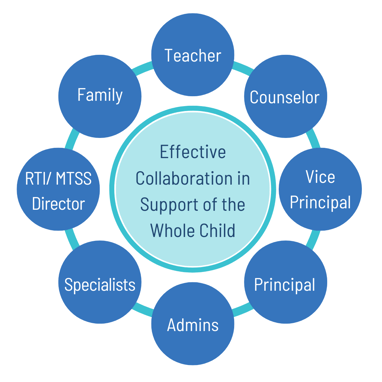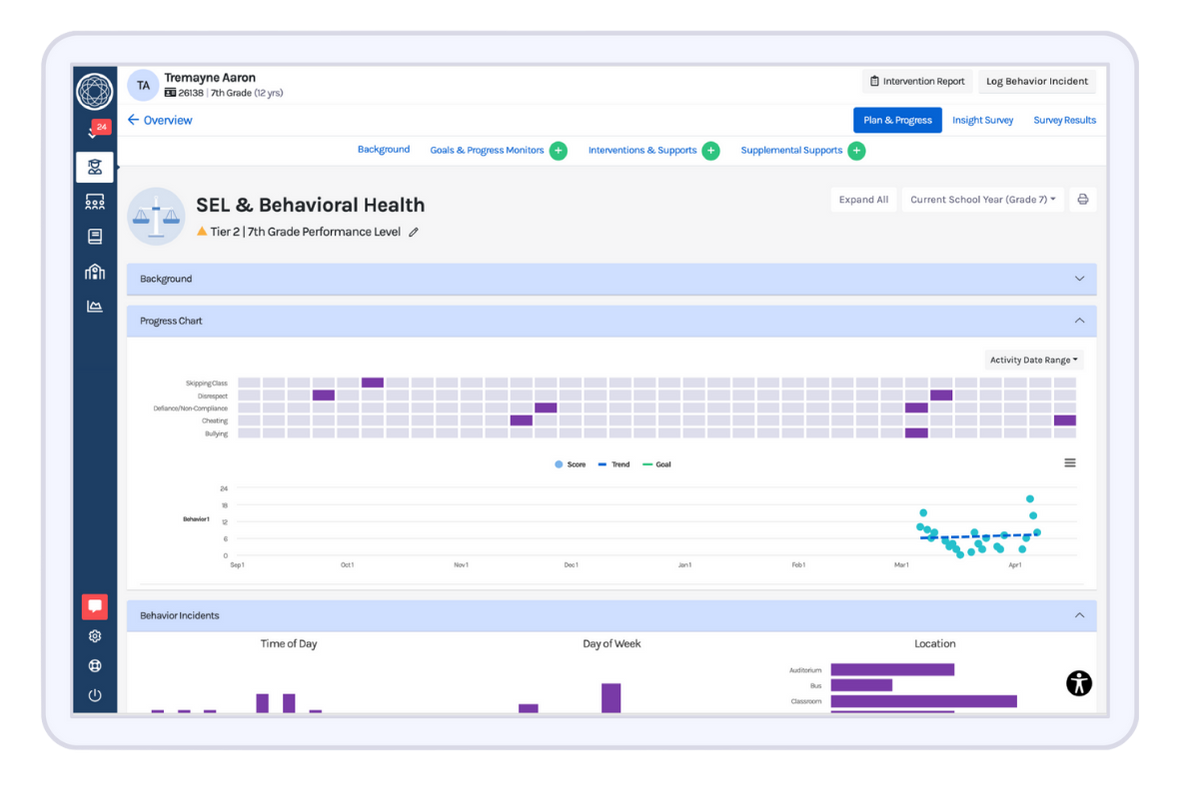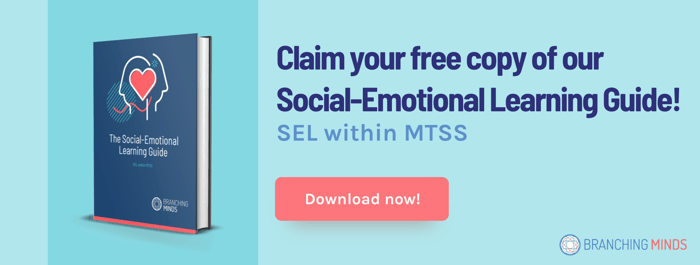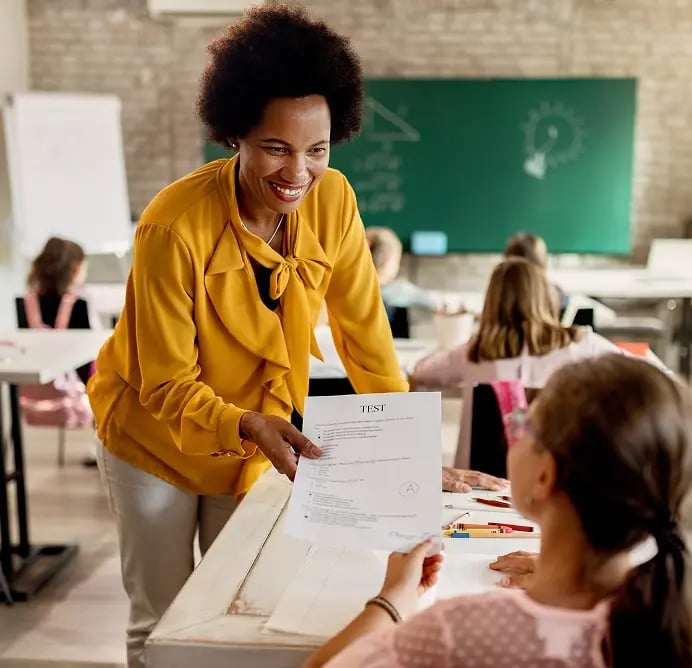The educational landscape is changing rapidly, and student behavior is at or near the top of the list of concerns. According to the National Center for Education Statistics (NCES), 84% of schools report a negative impact on student behavioral development due to the pandemic, and 87% report a negative impact on students’ socio-emotional development (NCES, 2022).
Behavior Staff in MTSS: Key Takeaways
- When a campus is undertrained and understaffed in behavior support personnel, they are more likely to engage in punitive disciplinary actions.
- By building teacher capacity over time, the behavior of staff can shift from emergency responders to inclusive community builders who can better support students identified as needing higher levels of support.
- With appropriate staffing levels, behavior staff can focus on what makes a difference for students: an MTSS/PBIS system that fits the context, implementing a system of proactive interventions, using restorative practices, and building teacher capacity.
The escalation in challenging student behavior requires educational leaders to shift their focus to student-centered methods that require the effective use of behavior staff on campus. Leaders must change adult procedures and protocols to positively affect student outcomes.
For decades, discipline practices by undertrained or understaffed behavior teams have often resulted in punitive and exclusionary consequences given to students who exhibited maladaptive behaviors. Unfortunately, the disciplinary actions that remove students from the classroom and school are likely to conflict with school missions to help all students achieve their fullest potential.
With appropriate staffing levels and training, behavior staff can move out of a reactive disciplinary role and focus on what makes a lasting difference for students: a Multi-Tiered System of Supports (MTSS) for behavior—also known as Positive Behavior Interventions and Supports (PBIS)—that fits the context and provides a tiered menu of proactive behavioral interventions, using restorative practices, and building teacher capacity.
Appropriate Staffing Levels and Roles
Leaders who develop a team of trained behavioral staff can sustain positive changes in student behavior and create a student-centered campus dedicated to inclusion and success. When a campus is understaffed in support personnel, it is more likely to engage in punitive disciplinary actions (Grayman, 2019). A campus needs to have enough behavioral staff to successfully manage the progress monitoring of up to 15% of the student population who may be placed in behavior interventions.
In addition, there should be dedicated staff to handle general education behavior concerns when they arise so that the individual running groups and facilitating interventions is not being pulled to handle these discipline issues.
Dedicated campus behavior staff roles include, but are not limited to:
- Behavior deans or vice principals with a focus on behavior
- These individuals manage the day-to-day behavior that occurs in general education classrooms or on campus in less structured areas.
- They work with students to assign appropriate consequences for behavior and with problem-solving teams to develop intervention plans.
- These individuals should only be working with the students when the behavior is a major concern or the teacher has exhausted their resources in classroom intervention attempts with the specific behavior.
- Special education case carriers and paraprofessionals (especially those working with students who have behavior intervention plans)
Special education teachers, case carriers, paraprofessionals, and PBIS Coaches are often staff members who find themselves supporting a specific student or group of students in terms of behavior. Empowering these staff members to be informed implementers of proactive behavior strategies allows the behavior staff to more easily bridge the gap to supporting all teachers on campus.
A campus may need additional staff to support behavior. They would be responsible for teaching social-emotional skills, connecting with parents or guardians, ensuring the correct placement in supports based on function-based assessments, or supporting the student on a predictable interval to ensure their success.
Other campus staff that may be in a supportive role for behavior intervention include:
- Counselors and social workers
- Parent outreach liaisons
- Paraprofessionals in a behavior support role
District-Level Behavior Roles
District-level staff are assets to the campus behavior teams and allow for more coordination, resources, and support to be provided to them and, therefore, to the students.
District-level behavior roles can include:
- Directors of MTSS, Child Welfare, and Attendance, and Special Education
- Coordinator of Social-Emotional Learning
- Coordinator of Positive Behavior Interventions and Supports, or School Climate and Culture
There may also be professionals with behavior expertise who work across multiple sites. This includes but is not limited to:
- School Psychologists
- Board Certified Behavior Analysts
- At-Promise Counselors
- Social Emotional Support Specialists
- Mental Health Therapists
- Climate and Culture Coaches or Specialists
An example of a model among behavior staff is a Climate and Culture Coach, a role found at middle schools in Fontana Unified School District, in Southern California. This district-level personnel supports a site’s PBIS, restorative practices, and MTSS implementation at each middle school. This individual is responsible for ensuring the creation of the tiered levels of PBIS, implementing proactive interventions like check-in/check-out, skill-based groups, and restorative interventions used in response to office discipline referrals.

Building and Sustaining an MTSS/PBIS System That Fits the Context
Behavior staff cannot do this work unsupported or in isolation. District and campus leaders must be at the forefront in the implementation of PBIS, restorative practice, and proactive interventions for students. School leaders who are open to changing the narrative about discipline and behavior from one of punishment to one of support and skill building are better equipped to create lasting change in their classrooms and school buildings.
For best results, all adults who interact with students will use the common language, model the expectations, teach students how to meet those expectations in their context, and provide acknowledgments for appropriate or expected behavior. When staff, students, and families know the school’s vision and 3-5 school-wide expectations, as well as the practices and common language, there is consistency among all stakeholders. It is not enough for the PBIS team or some staff to be consistent. All staff members must be consistent and part of the process.
We can create this consistency and sense of safety by:
- Revisiting the expectations regularly
- Providing multiple ways for students to see and hear what is expected of them
- Thinking to reteach before punishing students for misbehavior
Once the systems, data, and practices are in place, experimental research shows a reduction in problem behavior (Sugai & Horner, 2009). Students are more likely to do what is expected of them. Increased academic performance comes with higher levels of belonging and fewer classroom disruptions due to misbehavior.
- Increased attendance results as students are more likely to feel pride in their school and want to do well.
- Improved perception of safety results from students feeling as though they are a part of the community as a whole who have a common mission and vision.
- Improved organizational efficiency is caused by the predictability of the discipline policies built with staff buy-in and feedback.
- Reduction in staff turnover is related to higher levels of teacher efficacy which is created when teachers have predictability in discipline and support for students.
- Reduction in teacher-reported bullying behavior or peer rejection is another beneficial outcome of predictable and safe school cultures (Waasdorp et al., 2012).
These outcomes are made possible by the behavior staff who are regularly checking the implementation fidelity of PBIS. Behavior staff are leaders on the campus PBIS team along with Tier 2 and Tier 3 behavior intervention teams. They are trained in PBIS interventions and best practices, and they are willing to run, train, and model best practices to school staff.
Once the team has worked to build school-wide investment in Tier 1 PBIS implementation, they can begin to provide a menu of proactive interventions for students who need additional support. Behavior staff focus on placement, progress monitoring, and celebrating the success of students who meet their academic, behavior, or social-emotional growth goals.
Use of Restorative Practices
Behavior staff can be strategically empowered to change the narrative of behavior intervention. School leaders have the power to shift from punitive to restorative discipline practices. In the past, the focus of school discipline was to punish the wrongdoer and to discourage future misbehavior. Research shows that these punishments typically satisfy the punisher or observer of the misbehavior, but have little lasting effect on the punished (Losen, 2011).
Restorative discipline practices allow students to recognize and repair the harm caused by their actions. It is important to note that restorative practice does not mean that the individual is shielded from consequences. Rather, any appropriate consequences take place, and the student has the opportunity to repair the relationships that have been harmed by their actions so that they can learn from their mistakes and move forward in a positive way.
Behavior staff need to know why punitive discipline is a weak tool for lasting change and why restorative practice is a more effective means to change student behavior. Grayson (2019) discusses the following flaws of punitive discipline:
- Punitive discipline doesn’t focus on helping either the person who caused the harm or the person who was harmed.
- Punitive discipline doesn’t let educators educate as it simply removes the child from the environment where he or she can learn to do or be better.
- Punitive discipline undermines social and emotional learning as it does not hold the child accountable for their actions’ effect on others.
- Punitive discipline makes school feel like a prison, not a community — and it violates the ideals of many educators.
Restorative Practices provide educators with an avenue for training in effective statements, community and restorative circles, and restorative conferences. All behavior staff should be trained in restorative practices so that they recognize behavior as a means of communication.
Classroom disruption, disrespect to teachers and peers, and bullying are among the most common items of concern for student behavior. Each of these problem behaviors can be more effectively addressed through the development of empathy for fellow students and positive student-adult relationships on campus (de Ruiter et al. 2019).
Interventions that allow students to reflect on their behavior, identify the way others are affected by their behavior and require them to take accountability for their actions by working with the individual or school to right the wrong will be more lasting in changing student behavior (Mirsky & Korr, 2014). The interventions would be proactive, in response to the screeners built into the PBIS or MTSS system, and reactive, in response to misbehaviors in the classroom or on campus, and result in an office discipline referral.
Building Teacher Capacity
No matter how great a behavior staff is, the teachers spend the most time with students. The impact of a behavior staff is vastly multiplied when they empower teachers to manage their own classrooms well, reinforce school-wide expectations, and build strong relationships. Behavior staff provide training, modeling, and coaching in PBIS, how to respond to misbehavior, how to implement classroom-based interventions, and restorative practices.
This coaching work should be a gradual release where teachers can request the support of behavior staff for having difficult conversations with students. An “I do, We do, You do” model is suggested to allow the teacher to gain ownership of the accountability check with the student. This conversation will always be more effective if the teacher is working to build a meaningful relationship with the student. Keeping these conversations between the teacher and the student, with the dean or behavior staff support, can create a meaningful moment where the student sees the teacher as being willing to work with them to change their behavior.
By building teacher capacity over time, the behavior staff can shift from being emergency responders to being inclusive community-builders who can better support the students who need higher support.
💡 Related Resource: MTSS Requires Capacity Building
How Leaders Can Build Effective Behavior Teams
As a school leader, it is important to start by assessing your current behavior staff, their training, and their job descriptions in order to build a team that is equipped for the implementation of MTSS behavior and restorative practices.
With appropriate staffing levels and training, behavior staff can begin to focus on what makes a difference for students: an MTSS/PBIS system that fits the context, including a tiered menu of proactive interventions, using restorative practices, and building teacher capacity. A leader who is dedicated to student success can utilize behavior staff effectively to make positive, lasting changes for staff and students.
![[Guest Author] Morgan Goering-avatar](https://www.branchingminds.com/hs-fs/hubfs/image2.png?width=82&height=82&name=image2.png)
About the author
[Guest Author] Morgan Goering
Morgan Goering is an MTSS Education Consultant for Branching Minds. As a former middle school math teacher, climate and culture coach, and assistant director of student support services, she has over 10 years of experience working with students, teachers, staff members, and administrators. Her passion for PBIS and MTSS implementation have allowed her to support the creation of student support systems in various schools across the country. She holds a Bachelor’s in Mathematics, a Master’s degree in Instruction and Curriculum Development, and a Specialist Degree and Licensure in K-12 Principal Leadership. Her desire to be a lifelong learner is evident as she pursues her Doctorate in Teaching and Learning. She is a passionate educator seeking a platform for creating positive change in education.

Behavior Documentation Reimagined 💫
Ready to rethink behavior documentation? Branching Minds helps turn incident data into meaningful action with tools that simplify the process and empower educators.


















.png?width=716&height=522&name=5%20Tips%20for%20De-Escalation%20and%20Building%20Strong%20Relationships%20with%20Students(preview).png)